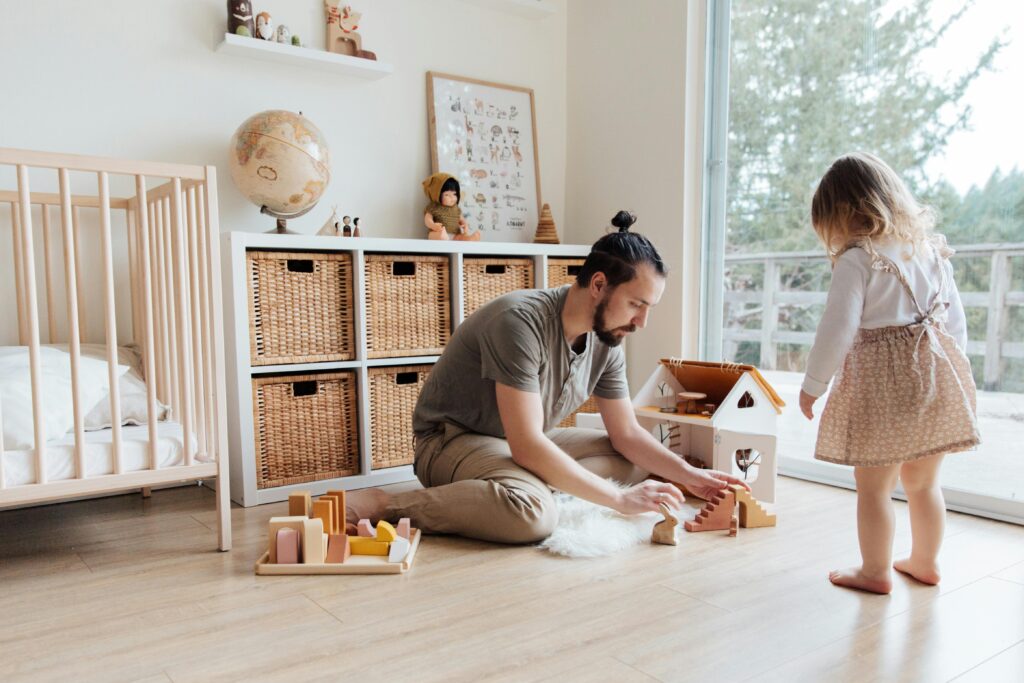You’re two thumb-swipes away from deleting this dating app forever. Shirtless gym selfies. Bios that say, ‘Just here for a good time’ and ‘I don’t believe in labels.’ Eye roll. You want marriage, a house, kids. Maybe even an SUV. Is that too much to ask?
You think maybe it’s just the apps, but then it happens in real life. You move into your new place (quiet street, good light, solid water pressure). Then, you notice the neighbor. He’s got a toddler clinging to his cargo shorts, pushing a double stroller with one hand and balancing a sippy cup with the other. His wedding band glints in the sunlight. You know he’s taken, but something about the way he ties little sneakers and say ‘Okay, team, let’s go!’ with that dad-voice just does it for you.
Then—boom. There he is. On the app. Not the same guy, but wow, very similar.
A goofy smile with slightly crooked bottom teeth, his bio reads: ‘Looking for my penguin to build a life with. Also, I’d make a pretty great girl dad. French braid duty and tea parties? I’m in.’
Your uterus literally screams. You swipe right so fast you nearly throw your phone.
Okay, so he is not your usual type. A little nerdy. Happy eyes. But something about the mention of fatherhood makes your stomach flutter. Was this a new kink? Responsible, emotionally available DAD energy?
You’d been craving edge, but maybe you wanted intention. And yeah, he is kind of hot in that ‘reads parenting books for fun’ kind of way. You want a man who can assemble IKEA furniture and hold a baby (look at those arms!).
So, you wait for the match notification like your future babies depend on it.
What is going on with you?
Your baby-making bits might be onto something deeper than just tea-party fantasies. This phenomenon is researched in “Call Me Daddy: How Long-Term Desirability is Influenced by Intention for Fatherhood,” by Ryan C. Anderson, Ph.D., and Michele K. Survey, Ph.D.
There’s evolutionary psychology behind why that ‘future girl dad’ bio hit harder than looks ever could. This study explores how the mere mention of fatherhood—or just having been someone’s boyfriend before—can make a guy way more attractive.

Evolution made me do it
Let’s be real, making babies isn’t biologically equal work. Guys can shoot their shot (literally) and bounce. Meanwhile, you’re investing months of pregnancy, years of care, and a plethora of snacks you can’t eat. This is called high parental investment.
As the study puts it, “Parental investment includes both the specific initial metabolic contribution to sex cells and any subsequent investment broadly benefiting one’s offspring (feeding, protecting, nurturing, etc.).” Basically, whoever puts in more effort raising a kid becomes the “limiting resource,” AKA more valuable, more picky, and way more selective about who gets in their reproductive DMs.
Because of this, human females are evolutionarily wired to search for partners who will stick around. Not just hot. Not just rich. But willing to invest in their kids. Bonus points if they look like they’d crush it at coaching Little League.
And here’s where it gets interesting.
The copycat game
Ever been into a guy because someone else was? That’s mate copying. And yes, science says it’s real.
It’s when you notice that others have chosen a man, and you assume he must be a catch. “He has effectively been implicitly approved as a romantic partner,” the authors say. And that approval is contagious.
This strategy makes evolutionary sense. Assessing a mate takes energy and risk. If someone else did that vetting, it’s like a Sims-level rosebud shortcut. This isn’t just a human thing; animals do it, too. And it’s starting to be studied more, especially how prior relationship experience changes how desirable a man appears.
Then there’s mate poaching.
While related to mate copying, this is a little more morally gray. It’s when you actively pursue someone already in a relationship.
According to the study, poaching “strictly involves the pursuit of and eventual pairing with a currently romantically involved individual.” It’s like, ‘Oh, she’s got him? Challenge accepted.’
Cut to the current study
This research wanted to figure out how women respond to a man’s intention for fatherhood, his relationship history, and how these factors change how desirable he seems as a long-term partner.
The participants, all women under 40, were shown silhouettes of men with short bios. No faces, no built bodies, just information like whether he wanted kids and if he had a past relationship. The women rated each man on a 7-point scale for long-term desirability.
Here’s what the researchers expected to find:
- Men who want to be dads would be seen as more desirable.
- Having a former partner (even if currently single) would boost a guy’s long-term appeal.
- It would be even better if a guy had a positive review from an ex.
They also wanted to answer the question: Would women rate men currently in relationships more desirable than men who were just formerly partnered?

Who’s getting swiped right (or not)?
To begin with, a guy who wanted kids and had a glowing review from an ex wasn’t rated as highly as you’d think. While women like the intention of being a dad and like it when their exes say nice things, when both are combined, something feels off. “These two characteristics in concert were considered undesirable,” the researchers explained.
Why? Maybe he felt too perfect. “Claims or offers seeming ‘too good to be true’ can elicit suspicion and lead to rejection.” Kind of like that guy with a six-pack, Ph.D., and rescue puppies in his profile. You should like him. But something tells you to pass.
Then, there’s the ‘no kids’ guy with a sweet testimonial from an ex. Surprisingly, that combo was good.
It “may compensate for an undesirable anti-fatherhood intention,” the research team speculates. If you don’t want kids but your ex says you’re a great human, you’re not totally off the market.
However, women might be suspicious. Why is your ex so nice? Are you still texting? “If their relationship is unresolved, there is a chance that he will go back to her.” And no one wants to be the second choice.
So, what did work? Men who said they want to be dads were generally more desirable—unless their ex had something nice to say, which oddly made them less appealing.

Mate copying is real
The study confirmed it again. Women found previously partnered men more desirable than men with no relationship history. Because it’s social proof—If someone liked him, he’s probably a safe(r) bet.
Even a simple silhouette with a bio, a man with an ex scored better.
The deets on mate poaching
“Men currently in a relationship were considered more desirable as long-term partners.” (R.C. Anderson, et al.)
This is classic mate poaching: seeing someone already chosen and wanting them more. The authors clarify that it’s not the same as actual stealing. Just the thought that he’s desirable because he’s taken. It taps into a real bias—if someone is already in a relationship, they’ve been vetted. They’re not just attractive, they’re safe.
Limitations and strengths
Most of the participants were university students, with an average age of 21.73. This skews young and possibly career focused. Also, these were hypothetical scenarios. No real dating apps or real heartbreak.
Even with these limits, the setup was clever. By stripping away physical attractiveness and focusing on just bios, the study isolated what women say they value long-term
The controlled design helped test multiple combinations with the mess of actual relationships. And using a younger, more mate-copying-prone group made those effects easier to detect.

What does this all mean?
Dad energy and a proven relationship history can be an important turn on for women. But too much of a good thing, such as wanting kids and positive ex reviews, can backfire. In fact, the research team suggests “this particular finding warrants further exploration and interpretation.”
There’s nuance to attraction and desirability. It’s not simply checking off boxes, it’s about how those boxes feel in combination and what vibes they give off.
Oh! And if you’re out there hoping no one notices your relationship history, they definitely do.




